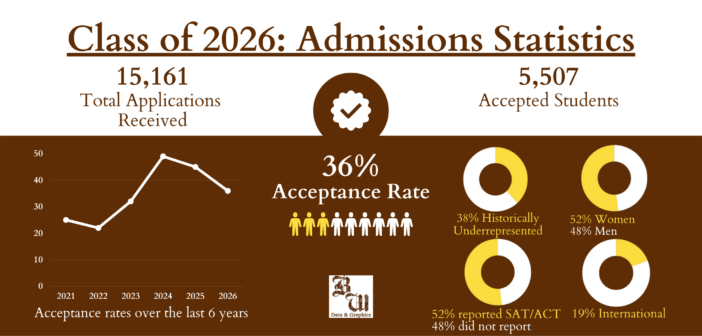Lehigh released its regular decision admissions results on March 24, concluding the admissions process for the incoming class of 2026.
A total of 5,507 students were admitted, excluding waitlisted students, resulting in an acceptance rate of 36 percent. The Admissions Office received 15,161 total applications across all three admissions waves, including two rounds of early decision and one round of regular decision.
This is a lower acceptance rate than the past two years. The previous two incoming classes of Lehigh students saw a dramatic increase in undergraduate acceptance rates. What was once averaging somewhere in the low 20s had risen to the 40s and spiked at a 49.5 percent acceptance rate for the class of 2024.
Director of Admissions Bruce Bunnick said the acceptance rate for the class of 2026 dropped by 10 percent from last year, while the university saw a 7 percent increase in the number of applications received.
Bunnick said the university is seeking to enroll about 1,500 new first year students for the incoming class of 2026. He said class sizes have consistently been within a margin of that number for the past three years, with 1,519 students enrolled in the class of 2025.
Of the 5,507 students who were admitted to Lehigh this year, 2,858 are women and 2,649 are men. Bunnick said the university is trying to attract more women and more diversity in STEM disciplines.
While Bunnick said the university cannot fully determine how the class of 2026 will look in terms of diversity until students are fully enrolled, over 38 percent of admitted applicants were domestic students from historically underrepresented backgrounds.
“We’re trying to attract more students wholesale to consider and investigate, and perhaps apply to Lehigh,” Bunnick said. “But we are being very purposeful and deliberate with regard to our recruitment of women and historically underrepresented students to the applicant pool, and eventually to the university.”
Lehigh elected to become test-optional for the class of 2025, and it was announced last semester that the university would remain test-optional until applicants for the class of 2027 submit their applications.
Bunnick said the university will remain test-optional for the foreseeable future, and there has not yet been a discussion as to whether Lehigh will return to requiring standardized test scores.
Applicants for class of 2026 had the ability to indicate whether or not they wanted Lehigh to use their standardized test scores in a review of their applications. Of the 15,161 applicants, 48 percent said they did not want Lehigh to consider their standardized testing.
Bunnick said the university is attempting to increase its international student population, though COVID-19 continues to create challenges. Regardless, international students made up 19 percent of this year’s applicant pool, a 4 percent increase from last year.
“I don’t say this flippantly, but the world’s a big place and to send people physically out of the office to the world like we would pre-COVID times was obviously an ongoing challenge,” Bunnick said. “I believe that we will be physically traveling overseas this coming fall. I wouldn’t set it in stone necessarily, but I’m optimistic to be able to have staff go back out into the world now.”
From a financial aid standpoint, Director of the Office of Financial Aid Jennifer Mertz said financial aid packages and policies for the class of 2026 are generally in line with how last year looked.
Mertz said one key difference is that this year’s financial aid application asked for income from the 2020 tax returns, which will see impacts from the pandemic. She said many families saw decreased income in 2020, while others actually saw increased income due to government resources such as unemployment eligibility.
“Many families had changes in income in 2020,” Mertz said. “We’re just working through that with families and trying to figure out if their aid package is based on accurate income.”
Stefanie Burke, the assistant dean and director of First-Year Experience, said the first-year programming undergoes changes every year in accordance with feedback from students and stakeholders. She said the general program will look the same for the class of 2026, but some of the content will be updated.
Burke said the OFYE is working to make orientation a more seamless experience by having sessions that build off of each other.
“We are also trying to think intentionally about how we incorporate that wellness piece into orientation because we know it can be a little overwhelming,” Burke said. “That is a big focus of ours next year as we think about the start of the year.”
Burke said this focus on wellness will include modeling self-care and other wellness practices within orientation.
Bunnick said the Admissions Office is looking forward to May 1, the national college decision day.
“It was a good year in terms of not only the growth in applications, but the diversity of the pool,” Bunnick said. “We did see a lower admit rate, which was positive, but it was a good year.”






Comment policy
Comments posted to The Brown and White website are reviewed by a moderator before being approved. Incendiary speech or harassing language, including comments targeted at individuals, may be deemed unacceptable and not published. Spam and other soliciting will also be declined.
The Brown and White also reserves the right to not publish entirely anonymous comments.
3 Comments
so intellect, ability, gpa, sat scores out the window huh? it’s all about americas great race to bottom now.
@A: It’s more like Lehigh’s descent to the bottom of the USNews charts. In the early aughts, it was in the low 30’s for on the National Universities list. Now it seems to tumble just a little bit more. I was embarrassed to be associated years ago and now I pretty much only talk about where I went to grad school, the prep school I attended, and the college where I took summer programs while in HS if the topic of education comes up unless prodded about undergrad.
Academia loser that seeks validation through rankings. Kind of weird when conceited individuals like you need to hide where you went to school because of how others view your academic establishment and only feel inclined to mention your grad school so you could feel self-validated. The Asch paradigm is a sight to behold.